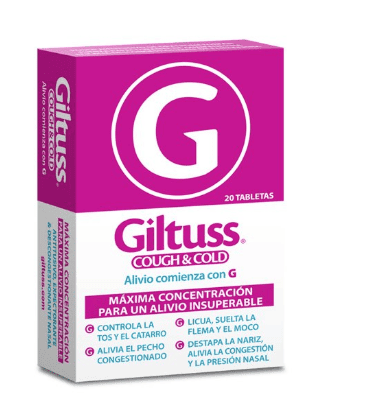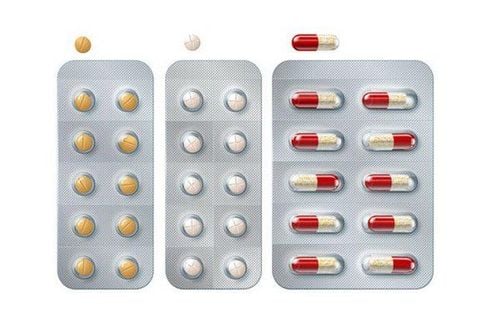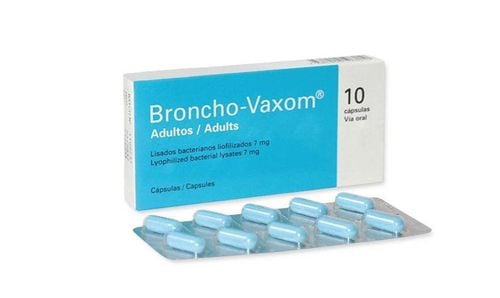This is an automatically translated article.
Cybercef 750 is a drug used only as prescribed by a doctor, a commonly used drug in the prescriptions of patients with infection-related problems. So what is Cybercef 750? What are the uses of Cybercef 750?1. What is Cybercef 750?
Cybercef 750 contains the active ingredient, the antibiotic Sultamicillin (in the form of Sultamicillin tosylate) 750mg. Cybercef 750 is prepared in the form of film-coated tablets for oral use, circulating with registration number VD-21461-14 produced by Domesco Medical Import-Export Joint Stock Company (Vietnam).
2. The spectrum of action of the drug Cybercef
After use and absorption into the body, Cybercef 750 will hydrolyze into Sulbactam and Ampicillin circulating in the blood with a molecular ratio of 1:1. Biochemical studies on non-cellular bacteria have demonstrated that Sulbactam has the ability to irreversibly inactivate most beta-lactamase enzymes secreted by penicillin-resistant strains of bacteria, helping to protect penicillin antibiotics. and Cephalosporins are not destroyed by bacteria.
Cybercef 750 has a broad antibacterial spectrum, including both Gram-positive and Gram-negative bacteria such as Staphylococcus aureus, Staphylococcus epidermidis, Streptococcus pneumoniae, Streptococcus faecalis and other Streptococcus strains, Haemophilus influenzae and parainfluenzae, Branhamella catarrhalis, some anaerobes gas, Escherichia coli, Klebsiella, Proteus indol (+) and indol (-), Morganella morganii, Citrobacter, Enterobacter, Neisseria meningitidis and Neisseria gonorrhoeae.
3. Indications and contraindications of Cybercef 750
Cybercef 750 is indicated for the treatment of infections with ampicillin/Sulbactam susceptible strains, including:
Upper respiratory tract infections such as sinusitis, otitis media or tonsillitis; Lower respiratory tract infections, including bacterial pneumonia and bronchitis; Urinary tract infections and pyelonephritis; Skin and soft tissue infections; Gonococcal infection. On the other hand, the product Cybercef 750 is contraindicated for use in the following cases:
Allergy to Ampicillin, Sulbactam or excipients contained in Cybercef 750; Allergy to other penicillin group antibiotics; Caution should be exercised in patients with potential cross-allergic reactions to other beta-lactam antibiotics (eg Cephalosporins).
4. Dosage of Cybercef 750
Patients need to use Cybercef 750 according to the above indications with specific dosages as follows:
Adults and children weighing over 30kg: 1 tablet x 2 times/day; Children weighing less than 30kg: Use according to the dose of 25-50mg/kg/day, divided into 2 times; The duration of treatment with Cybercef 750 is from 5-14 days; Particularly for uncomplicated gonococcal infection, the patient only took a single dose of 3 Cybercef 750 tablets.
5. Cybercef 750 side effects
Anaphylactoid reactions, including maculopapular skin rash, urticaria, pruritus, exfoliative dermatitis or anaphylaxis...; Cybercef 750 can cause digestive disorders with manifestations such as loose stools, nausea, abdominal pain, intestinal spasms, epigastric pain, vomiting; Drowsiness, fatigue; Shortness of breath; Headache ; Cybercef 750 can cause disorders of the hematopoietic system, including anemia, thrombocytopenia, eosinophilia; Patients using Cybercef 750 may experience increased serum aminotransferase and/or bilirubin; Rarely, interstitial nephritis; Using Cybercef 750 has the risk of leading to secondary infections such as penicillin-resistant Staphylococcus aureus, gram-negative bacilli or Candida albican... when used for a long time or at high doses.
6. Cybercef 750 drug interactions
Concomitant use with other products containing Ampicillin and Sulbactam leads to an increase in the concentration and duration of action of Cybercef 750.
Administration of ampicillin to hyperuricemic patients treated with Allopurinol may increase the incidence of skin rashes.
Ampicillin in Cybercef 750 interacts with urine glucose testing with copper sulfate methods (Benedict, Clinitest), but has no effect on glucose-oxidase methods (clinistix, test-tape).
7. Be careful when using Cybercef 750
Penicillin antibiotics (such as Ampicillin in Cybercef 750) can cause hypersensitivity reactions (anaphylactic reactions), and cross-allergies have been reported between penicillins and other beta-lactams. Therefore, before starting treatment with Cybercef 750, patients should be carefully investigated and monitored for a history of hypersensitivity to penicillins, cephalosporins or any other drug. Cases of anaphylaxis when using Cybercef 750 should be treated immediately with adrenaline, corticosteroids and oxygen, and must ensure airway and intubate when necessary.
As with other antibiotics, superinfection due to the proliferation of bacteria or fungi resistant to Sultamicillin may occur during administration of Cybercef 750. In such cases, the drug should be discontinued and appropriate treatment measures taken.
During the use of Cybercef 750, patients are at risk of developing pseudomembranous enterocolitis caused by Clostridium difficile. Patients with symptoms of diarrhea should be considered at risk for this problem.
When treated with Cybercef 750 for a long time, patients should be periodically tested for liver function, kidney function, and hematopoietic function. Some cases of viral infections, especially those caused by macrocytic viruses and mononucleosis, have been reported with disseminated skin rash after ampicillin administration, therefore Cybercef 750 should be avoided in patients confirmed viral infection.
Experimental studies have shown no evidence of harmful effects of Cybercef 750 on the fetus and on fertility. Adequate and well-controlled studies in pregnant women indicate that Cybercef 750 should be administered to pregnant patients only when clearly needed.
Ampicillin and sulbactam in Cybercef 750 pass into breast milk in negligible amounts, however, to ensure safety, Cybercef 750 should not be used in patients who are breastfeeding.
Elderly people may have decreased renal function (due to age), so when using Cybercef 750 drug can prolong the half-life, but studies show that there is no need to adjust the dose in subjects. this.
Patients with advanced kidney disease (creatinine clearance less than 30ml/min) should adjust the dosage of Cybercef 750.
Ampicillin and Sulbactam did not affect the patient's attention, alertness and psychomotor abilities. Therefore, Cybercef 750 does not affect the ability to drive and use machines.
Please dial HOTLINE for more information or register for an appointment HERE. Download MyVinmec app to make appointments faster and to manage your bookings easily.













